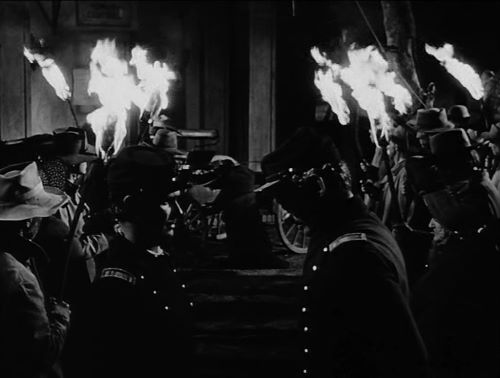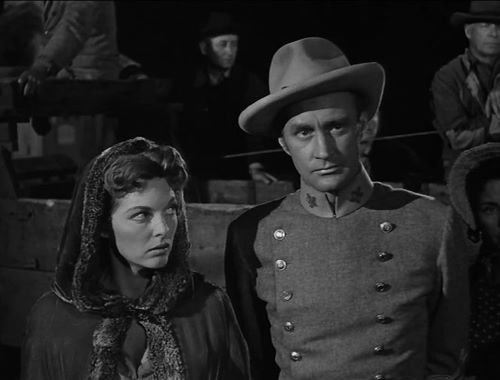Drango (1957) is a somewhat obscure western that makes for interesting viewing. Taken as a document of the Reconstruction era in the wake of the Civil War, it doesn’t really succeed or at least it’s not especially convincing. On the other hand, it is very effective indeed as an examination of redemption, and in this case atonement. It’s far from the first time I’ve featured a movie driven by that theme as the classic western era is awash with examples. The fact that the film largely succeeds in spite of some of its weaknesses is due in no small part to the work of its star Jeff Chandler.
One can practically taste the hostility at the beginning of the film. The implacably surly expressions of the inhabitants of the small town in Georgia which greet the new military governor give a strong indication of what lies ahead. It’s the post-Civil War period and the old wounds are still raw, old resentments still nurtured. The new governor is Major Drango (Jeff Chandler) and there is a brief, blink and you miss it reference to his past before more immediate concerns take over. Drango’s mission is to get things back to normal as soon as possible, which naturally involves seeing that law and order is restored. This kind of task requires considerable bridge building skills, something Drango sets about practicing as soon as possible. However, he is presented with an obstacle, a settler (Morris Ankrum) on an outlying farm turns up in his rooms hoping to persuade the Major to transport him to the nearest garrison for trial. This man was unsympathetic to the Confederacy and a raid on his property by returning veterans saw a man killed. Not unnaturally, he is dubious about receiving a fair trial in his home town. The rancor of his fellow citizens is tangible during his arraignment and his fears are to be proved correct when he’s subsequently abducted from the jail and lynched in the town square. It’s here that Drango’s guilt is first apparent, not least when faced with the scorn of the dead man’s daughter (Joanne Dru), and as the story progresses it becomes increasingly obvious that this is something he wears like a second skin. What is also clear is the fact that this guilt is rooted in something deeper, although exactly what is only revealed late in the day. In the meantime, he sets about winning hearts and minds, a goal made even more difficult by the subversive plotting of one of the town’s faded gentry (Ronald Howard), a man hell bent on fanning the flames of conflict once more.
Drango was made by Jeff Chandler’s production company Earlmar and he got hold of some fine talent to work on it. Elmer Bernstein wrote the score and those characteristic riffs and hooks he frequently employed can be heard throughout. The cinematography comes courtesy of James Wong Howe and his lighting of interiors and the nighttime scenes is as exemplary as one might expect. Hall Bartlett and Jules Bricken co-direct in a fairly matter-of-fact fashion but the pacing is good. Yet, as I mentioned at the top of this piece, there are weaknesses. If a film wants to be regarded as a serious consideration of the mood and effects of the Reconstruction era, then it’s not unreasonable to expect some reference to slavery. After all, this is set in a town in Georgia and a few of the characters live in the type of mansions to be found on plantations yet there is no mention whatsoever made of this. What’s more, the entire cast contains not one black face, which again strikes me as very odd indeed given the time and location depicted. The result is that there is a degree of artificiality to this image of a post-Civil War town and consequently the whole north-south friction aspect feels a bit fake. The film in essence starts to feel somewhat generic in its portrayal of post-conflict tensions. However, this is basically background material and what rescues the movie is the strong focus on atonement and redemption.
Jeff Chandler was an authoritative presence, a quality which grew as the years passed. He had what is commonly termed gravitas but that alone can make for dull viewing. Chandler’s great strength lay in his ability to convey a certain frailty behind the authority. He has a number of scenes where he gets to boss the situation, glaring down a horde of hungry and desperate townsmen as well as punching out a belligerent, bottle-wielding foe. He also makes a few speeches, which are heartfelt and impassioned but his best moments come in the smaller, quieter passages. The sensitivity of the man is clearly discernible when he has to extract a bullet from a patient who is still conscious, the concentration and reflected pain writ large on his features. Then there’s the potency of a simple and wordless scene where he leaves a few humble presents for a family of orphans on Christmas Day, and of course his carefully controlled outrage as he carries the remains of a youngster who has perished in a deliberate arson attack. All of this is buttressed by the corrosive guilt the man is carrying within – it’s only really when his true past is hauled out in the open that the reasoning which underpins his compassion makes sense.
Joanne Dru exudes stoicism as the woman who has lost her father, lost everything in life if truth be told. Her slow drift from bitterness to acceptance and finally love is achieved naturally and organically. Ronald Howard, in his first Hollywood film, provides an object lesson in pride and ruthlessness as the Canute-like figure who yearns for even more bloodshed. Julie London (Saddle the Wind, The Wonderful Country, Man of the West) was always an attractive addition to any cast and while her part here is less developed and less interesting than that of Joanne Dru, she brings an air of class to proceedings whenever she appears. There’s good support from Donald Crisp, Walter Sande, John Lupton, Milburn Stone and the curmudgeonly Chubby Johnson.
Drango is a hard-edged and at times quite dark redemptive western. Maybe it does not do or get everything right, but it’s a movie with its heart in the right place all the same. This is bolstered by a characteristically compassionate performance from Jeff Chandler, an actor who rarely if ever disappoints. As far as availability is concerned, there are DVDs from France and Italy, the latter looking crisp and clean though almost certainly presented open-matte. All told, this is a satisfying western that is well worth a look.





Colin-I had no idea DRANGO had a Euro release. Your review is pretty accurate as far as I’m concerned. Chandler,like John Payne seemed to enjoy playing anti heroes, characters tinged with darkness. Both actors were ideal in Noir-it’s a shame they were never teamed together in one.
These Euro releases are hard to keep track of. There’s a new Italian outfit called Sinister Cinema (nothing to do with the USA version) that has just released the very hard to find KKK drama THE BURNING CROSS from a 4K restoration from the original Italian 35mm negative-it has not been restored but is far far superior to the horrendous online versions. English subs are included but things like newspaper headlines are in Italian. There’s also a 30 second Italian prologue in Italian only-not included in the USA version. THE BURNING CROSS was picked up by Lippert in The States and Exclusive (Hammer) in the UK. The film is a real Poverty Row item but a real curio to be sure. Sinister have also released a 4K restoration of the impossible to find Brit Noir HATTER’S CASTLE on DVD as well-more to your taste,Colin I’m sure.
LikeLike
Sorry Typo in the above-THE BURNING CROSS is a new 4K transfer but is not a restoration-imperfections are there but it’s beautiful compared to the dreadful online versions-I guess the same applies to HATTER’S CASTLE.
LikeLike
Thanks for that info, John. I was unaware of those releases and I would be keen to see Hatter’s Castle as I like the cast and Lance Comfort’s movies in general. Here’s a link to the Amazon.it listing of that release for anyone else interested – link.
LikeLike
Thanks for your review of this. I have been a conductor for all things American Civil War since I was five and have never heard of this film. I’ll have to check out Kim Newman’s wonderful Western film book that has an excellent chapter on Civil War movies if he mentions this film. You are very right about how Reconstruction has been incorrectly depicted in the movies. By the way what is your favorite American Civil War movie(s)? ‘Gettysburg’, ‘Glory’, ‘Lincoln’, ‘The Hunley’, ‘The Day Lincoln was Shot’, and Frankenheimer’s ‘Andersonville’ among others for me and I recommend checking them out as historical accuracy has gotten better over the years.
LikeLike
Just off the top of my head I’d probably say Hugo Fregonese’s The Raid. I kind of like The Horse Soldiers too. It’s flawed and not Ford’s best, but it has grown on me over time.
LikeLike
I need to check ‘The Raid’. Heard good things. Also meant to mention ‘Ride with the Devil’ a good look at the border wars.
LikeLike
I’ll keep an eye out for this – Chandler is always worth watching. Have you ever seen Ten Seconds To Hell, about German bomb disposal experts in post-war Berlin, with him as the villain and Jack Palance as the hero – he’s very effective in that
LikeLike
A long time ago, but I have a copy and it’s long overdue a revisit, so thanks for the reminder.
LikeLike
I like him in Fuller’s ‘Merrill’s Maurauders’ such a interesting slice of WWII history.
LikeLiked by 1 person
The story told is a fascinating one and Fuller made a really fine movie out of it. Chandler was well cast, as he generally was in military roles, and while it’s both sobering and saddening that this would be his final film, it is also a superb one to go out on.
LikeLike
That’s a good movie, although I gather the studio made Fuller water it down. As someone who’s read a lot on the Burma campaign, probably just as well – although they took their objectives eventually, the unit was pretty much wrecked doing it.
LikeLike
Would be interesting if a modern version like ‘Band of Brothers’ or ‘The Pacific’ could be done on the story and hold nothing back. Speaking of the Burma campaign ‘Quartered Safe Out Here’ by George Macdonald Fraser is a wonderful read. I also enjoyed his attitude toward ‘Objective, Burma’. He wasn’t offended at all and thought it was a good war movie.
LikeLike
I have to say that that type of series about the Burma campaign would be my number one dream – the British Army’s longest retreat, the Japanese Army’s heaviest defeat, America’s first real war in South East Asia, the last triumph of the British Indian Army – and all over a country that didn’t want any of them! You could probably do about five seasons just on the politics!
Fraser’s book is good on the campaign from a squaddie’s point of view – although his Private McAuslan books, a fictional account of his post-war service in Egypt and Scotland after he got a commission, is better IMO (and much funnier!) And Objective, Burma is an entertaining war movie – and no more nonsense than many other war movies!
LikeLike
Chandler was powerful in most of what he did (IMO). One of several Actors that made the unlikely jump from Radio to Screen.
LikeLike
I hadn’t thought about making that transition before. On the other hand, there are of course plenty of examples of actors who worked successfully in radio after having made a name for themselves on the screen.
LikeLike